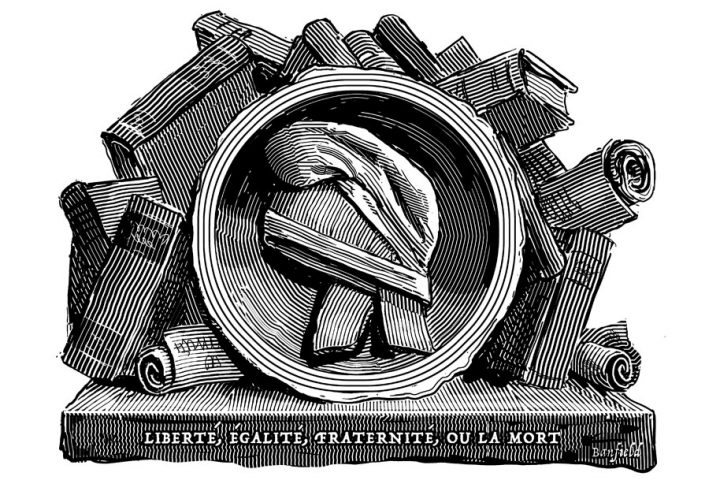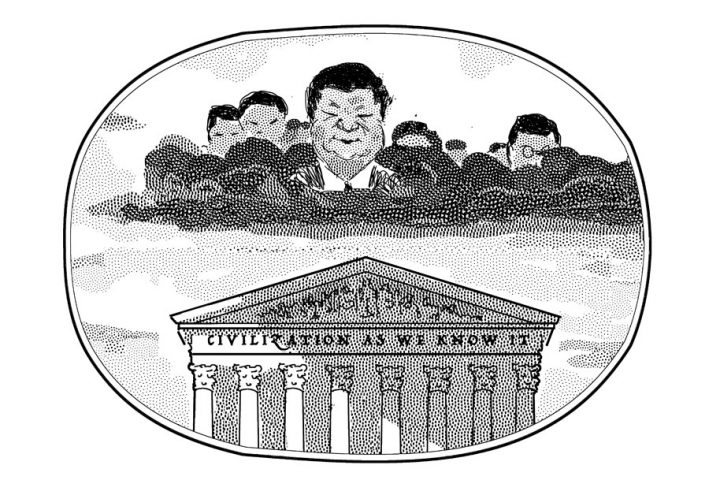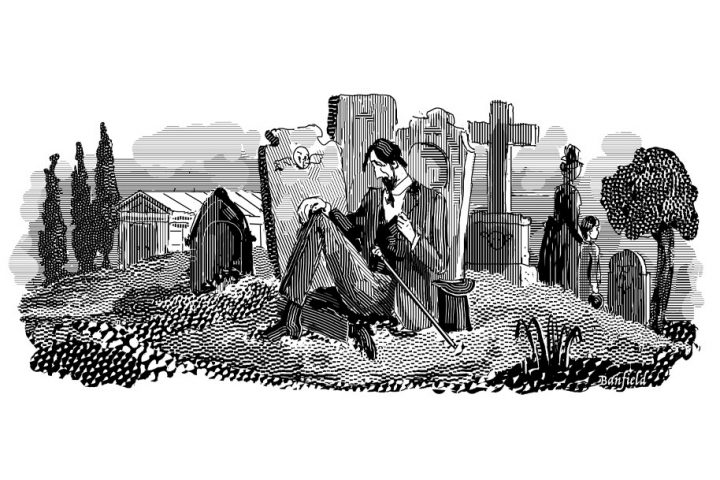Books Reviewed
Helena Rosenblatt’s The Lost History of Liberalism tells an interesting story and tells it well. The prose is lucid and vigorous, and the reader is led to comprehend the heart and soul of the liberal enterprise. A renowned expert on French liberal thought who teaches at the City University of New York, Rosenblatt provides fine treatments of important, if unjustly underestimated, thinkers such as Benjamin Constant and Madame de Staël, models of moderation amidst the ideological storms of the French Revolution and Napoleonic despotism. Rosenblatt sets out to vindicate liberalism’s moral honor—and largely succeeds.
For these reasons I happily recommend her book. Unfortunately, it contains a flaw that marks it from beginning to end. Rosenblatt is convinced liberalism began in France around the time of the 1789 French Revolution, when the word in its modern sense came into wide usage. Most curiously, she thinks it was only imported into the United States at the beginning of the 20th century, where it either became rights-obsessed and radically individualistic, or it turned to the state to ameliorate poverty and even the human condition. And oddly, Germany—surely not a liberal political culture for most of modernity—plays a greater role in her book than America. What accounts for these curiosities, this tale that seemingly begins in media res?
* * *
To be sure, Rosenblatt recognizes that liberalism has an important pre-history. She has intelligent things to say about liberalitas, the “noble and generous way of thinking and acting toward one’s fellow citizens” that defined liberality for Cicero and the most thoughtful Romans. And she is not wrong that this understanding of liberality has an aristocratic tinge but is nevertheless necessary for civilized life, even in modern times. Yet her rather arbitrary starting point ignores the crucial roles of Thomas Hobbes and John Locke in liberalism’s development. Like many intellectual historians, she fails to see how Hobbes designed the architecture of the liberal order: the state and civil society, the primacy of individual rights, an account of appetite and desire central to modern political economy, a marked suspicion of revealed religion, and, of course, the foundational “state of nature” he invented to radically account for human origins and obligations. If Rosenblatt read Michael Oakeshott, Leo Strauss, or Bertrand de Jouvenel with care, she would see how Hobbes’s thought points toward liberalism and not authoritarianism or totalitarianism. (Whether it provides an adequate moral foundation for a liberal order is another question. I have my doubts.)
As for Locke, Rosenblatt reads him as Hobbes’s opposite. She links him to Ciceronian or classical liberality—a stretch—and writes he was convinced “[m]en in a state of nature were capable of knowing and following a moral law.” This is a far too conventional rendering of Locke’s truly audacious moral and political reflection. To begin, there is no moral law for Locke—morality is the product of “mixed modes,” constructed by human beings. Even the notion of “murder” is a linguistic construction rather than a prohibition rooted in divine or natural law. And because he jettisons the classical Christian notion of “substance,” it is very difficult to know who precisely is this being with rights (and, Locke acknowledges reluctantly, some accompanying obligations and duties).
The tension between the exoteric and the esoteric Locke is constitutive of the tensions at the heart of modern liberty. Locke oscillates in his Second Treatise on Government between affirming human beings as “the workmanship of one omnipotent and infinitely wise maker” and telling us nature is extremely improvident—999/1,000ths of what we have and are come from human labor, industry, and initiative. Liberalism has always been torn between a residual affirmation of God’s sovereignty and an ever-more insistent claim of human self-sovereignty. This tension eventually gave over, as Rosenblatt writes, to the “religion of humanity,” proclaimed by Auguste Comte and John Stuart Mill in the 19th century. Dating liberalism to the conflagrations surrounding the French Revolution makes it harder for Rosenblatt to account for liberalism’s movement toward a dangerous and immoderate “emancipation of the will”—an emancipation from natural and divine limits already present in proto-liberals such as Niccolò Machiavelli and Hobbes.
Curiously, Rosenblatt says little about “the celebrated Montesquieu,” as the authors of The Federalist called him. But what political philosopher did more to give an account of the “statics and dynamics” of modern liberty? Montesquieu taught there could be no political liberty or security for citizens without active efforts to organize political and social arrangements, making power check power. Eighteenth-century England showed him political liberty at work “as in a mirror.” In his accounts of English liberty in The Spirit of the Laws, he outlines the separation of powers in a modern constitutional order: the superiority of representation to pure democracy, the connection between the jury and self-government, the place of competitive parties in a regime of liberty, and the role of free commerce and religious toleration in a free state. Yet Montesquieu is never doctrinaire. He cautions the French about slavishly imitating England’s “extreme liberty.” A more moderate liberty, balancing traditional estates with growing political and intellectual freedom, might better fit France’s long and distinctive historical experience.
As Pierre Manent has written, Montesquieu was liberal both in doctrine and in his prudential openness to balancing political principles with historical particularity. With Montesquieu, we are far from revolutionary fanaticism and the idea that one—and only one—model of liberty is available to humankind. He even foreshadows Alexis de Tocqueville, warning against the “spirit of extreme liberty,” when a salutary and necessary form of civic equality morphs into equality in every sphere—between fathers and children, magistrates and criminals, teachers and students. Montesquieu’s very modern liberalism was still touched by classical measure and the old-fashioned notion of liberalitas. Giving an adequate account of the “lost history of liberalism” surely demands a serious and substantial engagement with him. His moderation precedes, and to some extent informs, the moderation of the later French liberals Rosenblatt so admires. And he was deeper by far.
* * *
Rosenblatt writes sympathetically and intelligently about the Marquis de Lafayette, Madame de Staël, and particularly Benjamin Constant. She highlights Constant’s opposition to the unlimited authority unleashed by the French Revolution. “Entrust [unlimited authority] to one man, to several, to all,” he eloquently affirmed in 1815, “you will still find that it is equally an evil.” He and de Staël despised Napoleon’s “Caesarism,” though Constant agreed to write a liberal constitution (the “Benjamine”) for an allegedly chastened Napoleon when the latter briefly returned to power in 1815.
Rosenblatt spends much time explaining why the best French liberals refused to jettison religion altogether. Constant clearly appealed to (a rather amorphous) natural right or justice above human will. He had seen the horrors that politicized atheism unleashed in revolutionary France and drew the proper conclusions. But his account of religion in his massive historical and philosophical study, De la religion (On Religion, 1824-31), was anti-hierarchical, suspicious of revealed truths, excessively preoccupied with feelings and sentiments, vaguely pantheistic, and completely inattentive to sin and evil more broadly. Tocqueville, in contrast, believed religion could not jettison moral and intellectual authority without becoming incoherent at best, and a barely concealed atheistic humanitarianism at worst. And he famously argued in the second volume of Democracy in America that pantheism was the deadly enemy of the human race, for it erases crucial distinctions between higher and lower that are both true and necessary for human dignity.
* * *
Rosenblatt ably describes the Left’s mid-19th-century discovery of the “social question” and its subsequent assault on liberalism as a pernicious cover for the propertied classes’ privileges. She seems sympathetic to those liberals who turned to various forms of socialism and progressivism, without making such sympathies too emphatic. Her account of Catholic man of letters Orestes Brownson’s efforts to retain the best of political liberalism (constitutionalism, religious freedom) while opposing moral or religious indifferentism is broadly on mark. She beautifully compares Abraham Lincoln’s humane and generous character—his republican liberality—with the much less impressive character of France’s demagogic Napoleon III, nephew of the first and greatest Bonaparte. And she deftly describes Lincoln’s and Tocqueville’s principled and passionate opposition to chattel slavery—that pernicious institution that so undermined the honor and self-respect of a republic dedicated to the moral and civic equality of all.
Rosenblatt is at her weakest in discussing liberalism’s hostility to religion. She emphasizes Catholic opposition to liberalism during and after the French Revolution but understates the ferocious efforts by revolutionaries, including some so-called liberals, to destroy France’s Catholic heritage. Were the French Vendée peasants wrong to write that they experienced greater liberties under the kings of France than under the various revolutionary regimes that attacked their Catholic faith and traditional ways of life? I think not. This anti-Christian ire expressed itself again at the beginning of the 20th century when radicals and socialists under Premier Émile Combes closed most Catholic schools and outlawed almost every religious order. Their spirit was perhaps more Jacobin than liberal—but liberals were complicit in this cruel and despotic campaign. It goes much too far to suggest that Catholic intransigence somehow forced their hand, as Rosenblatt intimates.
* * *
The book’s “epilogue” is equally disappointing. By reducing liberalism to a golden moment centered around Constant and de Staël (and some fellow travelers in Germany) Rosenblatt blinds herself to the wisdom of a series of thinkers who come not to bury modern liberty but to give it a stronger, and truer, moral and intellectual foundation. She speaks dismissively of Reinhold Niebuhr, Eric Voegelin, Leo Strauss, and Pierre Manent—the latter of whom she confuses with Joseph de Maistre and the reactionary Pope Pius IX, author of the 1864 Syllabus of Errors. But wasn’t Niebuhr right that mainstream American liberalism, and liberal churches, had rejected a realistic notion of human nature and the evil intrinsic to the human condition? Had they not succumbed to a naïve pacifism when confronted by Hitler’s lupine imperialism? Were not far too many liberals—intellectuals and politicians alike—massively indulgent to Communist totalitarianism in the 20th century? In his 1978 Harvard Address Aleksandr Solzhenitsyn helpfully suggested that liberals had bought into “anthropocentricity”—the denial of a divine and natural order—and thus were vulnerable to the more consistent Communist affirmation of limitless human self-sovereignty. On this Niebuhr, Voegelin, and Solzhenitsyn agreed. Defending the decency and moderation of Benjamin Constant (a thinker I, too, respect) does not begin to address the question.
The regime of modern liberty desperately needs old wisdom—American and European—to avoid abandoning with contempt its own crucial, humanizing, and elevating preconditions. In that enterprise, Helena Rosenblatt’s preoccupation with the France of 1810 is of little or no help, even if her misguided book is not without its charms.




